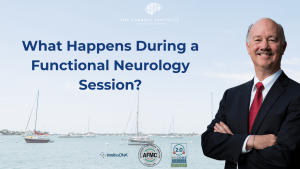Last Updated: October 2025
Most people believe that memory loss and cognitive decline are inevitable with age. However, emerging neuroscience tells a very different story. The brain is not a static organ—it’s constantly adapting, growing, and reorganizing itself through a process called neuroplasticity. At The Carroll Institute in Sarasota, Dr. Garland Glenn, DC, PhD, AFMC helps patients harness neuroplasticity to strengthen brain pathways, restore lost function, and even prevent the onset of cognitive decline.
What Is Neuroplasticity?
Neuroplasticity refers to the brain’s ability to rewire itself in response to new information, learning, or injury. When we form new habits, practice new skills, or undergo targeted therapy, the brain literally changes its structure by building new neural connections. This capacity for change is what allows stroke patients to relearn how to walk—or helps individuals recover from concussions and trauma.
In the context of cognitive decline, neuroplasticity means hope. Rather than being a one-way path toward memory loss, the brain can adapt and repair itself—especially when the underlying root causes of decline are identified and treated. This is the guiding principle behind both Functional Neurology and the ReCODE Protocol used at The Carroll Institute.
How Neuroplasticity Protects Brain Health
When neurons are stimulated in healthy ways—through movement, learning, sensory input, and cognitive exercise—they form stronger, faster connections. As a result, brain efficiency improves, and resilience against degeneration increases. Neuroplasticity also promotes better blood flow and nutrient delivery to neurons, which further supports long-term vitality.
However, when neurons are deprived of stimulation or damaged by inflammation, toxins, or poor metabolism, they begin to weaken. This is why a sedentary lifestyle, unmanaged stress, and nutrient deficiencies can accelerate memory decline. By using neuroplastic-based therapies early, we can reinforce the brain’s communication networks before those weaknesses become permanent.
Functional Neurology: Activating Neuroplastic Change
In Functional Neurology, every exercise is designed to stimulate specific brain regions and pathways. These exercises go far beyond general “brain games.” Instead, they use real-time neurological feedback—like eye movements, balance responses, and reaction timing—to identify which circuits are underperforming. Once those areas are mapped, targeted stimulation helps neurons re-establish communication, improving overall performance.
Dr. Glenn’s approach includes cutting-edge tools such as the Neuronic Photobiomodulation Helmet and the Neurosensory Motor Integrator (SMI). Photobiomodulation increases oxygen and energy production in the brain, while sensorimotor training reinforces communication between visual, auditory, and motor systems. Together, these technologies create ideal conditions for neuroplasticity—energizing the brain while retraining it to perform more efficiently.
Learn more about how these tools work in How Photobiomodulation and Sensory Therapy Rebuild Brain Pathways.
Neuroplasticity and the ReCODE Protocol: A Perfect Pairing
While Functional Neurology activates neuroplasticity through targeted stimulation, the ReCODE Protocol supports it by addressing the biological conditions that make brain healing possible. Neuroplasticity requires energy, blood flow, and cellular repair—and that depends on optimal metabolic health.
The ReCODE Protocol identifies and corrects root causes of brain decline, including insulin resistance, inflammation, infections, toxins, and hormone imbalances. When these factors are corrected, neurons gain the resources they need to thrive. Therefore, combining Functional Neurology and ReCODE creates a two-pronged approach: Functional Neurology rebuilds the brain’s “software,” while ReCODE repairs the “hardware.”
Signs You May Benefit from Neuroplastic Brain Training
You don’t need to wait until symptoms are severe to begin supporting neuroplasticity. In fact, early intervention often produces the best results. You may benefit from neuroplastic training if you experience:
- Memory lapses or word-finding difficulty
- Brain fog or reduced focus
- Slow reaction time or poor coordination
- Balance problems or dizziness
- Fatigue or mental exhaustion after reading or screen use
By identifying and retraining these patterns early, Dr. Glenn helps patients preserve brain vitality and prevent progression into more serious forms of cognitive decline. Each therapy plan is customized and evolves as the brain adapts, ensuring continuous improvement over time.
Why Start Now
Every year, new research confirms what Functional Neurologists have seen for decades—the brain’s ability to change is far greater than previously thought. Therefore, waiting for memory problems to become severe means missing the window where neuroplastic therapies can have the most impact. By investing in your brain’s adaptability now, you create a stronger, more resilient foundation for lifelong mental health.
Take the Next Step Toward Brain Longevity
Whether you’re working to reverse mild memory loss or simply want to protect your brain for the future, neuroplasticity-based therapy offers a powerful advantage. Book a Discovery Call with The Carroll Institute to learn how Functional Neurology and the ReCODE Protocol can help you strengthen, restore, and protect your brain health for years to come.
Sources
- Reversal of Cognitive Decline: A Novel Therapeutic Program — NIH (2014)
- Precision Medicine Approach to Alzheimer’s Disease — NIH (2023)
- Photobiomodulation Enhances Cognitive Function — Science Advances (2022)
- Neurosensory Motor Integrator — RKB Instruments
Medically reviewed by Dr. Garland Glenn, DC, PhD, AFMC (Advanced Functional Medicine Clinician)
The Carroll Institute — Sarasota, FL
Learn more about Dr. Glenn’s background and credentials: About Dr. Garland Glenn
This content is for educational purposes only and does not replace personalized medical advice.

Dr. Garland Glenn, DC, PhD, IFM, AFMC
Founder & Clinical Director, The Carroll Institute — Sarasota, FL
Dr. Garland Glenn is a board-certified chiropractic physician and functional medicine practitioner specializing in cognitive health, neurodegeneration, and root-cause medicine. Certified as an AFMC (Advanced Functional Medicine Clinician) and Institute for Functional Medicine (IFM) trained, he has also completed over 500 hours of advanced training in Functional Neurology under Dr. Ted Carrick, founder of the Carrick Institute.
At The Carroll Institute, Dr. Glenn leads Sarasota’s only ReCODE-certified Functional Neurology program, helping patients reverse or prevent cognitive decline through the Bredesen ReCODE Protocol, neuroplasticity exercises, and personalized functional medicine care.
Learn more about his background and approach at About Dr. Garland Glenn.
– schedule now –
free discovery call
To help you get started, we offer a free 20-minute Discovery Phone Consultation. During this call, you will be able to talk with one of our Certified Brain Health Coaches about what going on with you or your loved one and find out if we can help. Please review our FAQs prior to scheduling your free call. We look forward to talking with you soon and helping you Save Your Brain.
(yes, it’s totally free!)
ReCODE® is a registered program developed by Dr. Dale Bredesen and licensed through Apollo Health. Dr. Garland Glenn is a certified ReCODE practitioner.

